Rules Ex-Presidents Have to Follow After Leaving the White House
Stepping down from a high-profile position like being president of the United States is something far from ordinary. Living a low-key life like before is almost impossible. For this reason, there are guidelines, policies, and procedures in place to ensure that all recent former presidents of the United States act appropriately after their departure from the White House.
As much as they may want to simply step back into a casual lifestyle, it is not easy going back to everyday life when you were the US president just a few days ago. What previous presidents aren’t allowed to do and the privileges that come with that particular retirement plan are laid out in this article. So, if you are curious about these fascinating (and sometimes bizarre) rules, we encourage you to keep reading!
1. The Former Presidents Act
Before Congress established the Former Presidents Act in 1958, America’s former presidents were mostly on their own after they stepped down. To mention a few, George Washington made a fortune manufacturing whiskey at his Mount Vernon estate, Williams Howard Taft got appointed to the Supreme Court, and Theodore Roosevelt resorted to nonfiction writing.
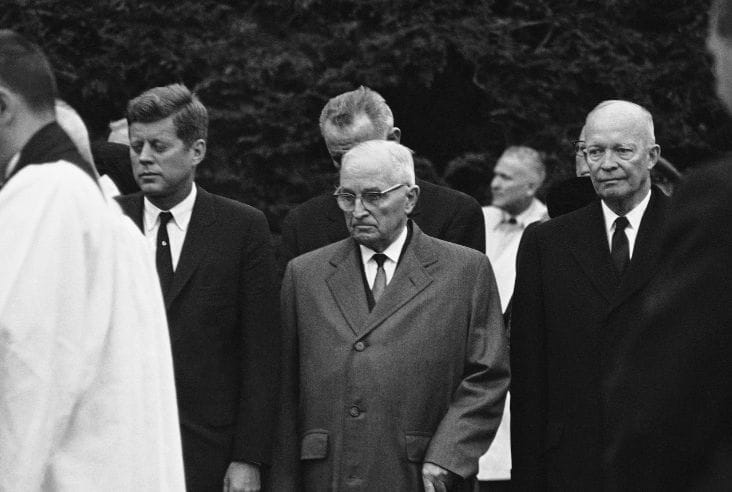
AP Photo
However, life beyond the White House was not always easy for the nation’s most prominent officials. After leaving the white house, Harry Truman was practically bankrupt and dependent on his small military pension from World War I. This was partially due to his wish not to monetize his old position by taking advantage of the numerous job offers he received. The Former Presidents Act was enacted in response to Truman’s financial difficulties.
2. They Get A Yearly Pension as a Benefit
President Dwight Eisenhower’s administration pushed for passage of this bill, which resulted in a $25,000 per year pension for former officials, which is equivalent to nearly $225,000 presently. As of the fiscal year 2020, an Executive Level I employee’s compensation was $219,200, and the pension is equal to that income.

AP Photo/Amy Sancetta
There are no restrictions on a pension being provided to previous presidents who resigned from the position, such as Richard Nixon. However, the pension fund, which is funded by taxpayers, does not pay out to those who are ousted from office through impeachment.
3. They Receive Lifelong Secret Service Security
Even if an individual is no longer president, they can remain a target for assailants. The Former Presidents Act includes lifetime Secret Service protection as one of the most valuable benefits. This is one of the most appealing benefits for the former presidents and their families.

AP Photo/Dave Kolpack
The security detail includes not only the former president and his or her spouse but also their children up to the age of sixteen. Ex-presidents can choose whether or not to take advantage of this benefit. Famously, Richard Nixon decided to take things into his own hands 11 years after he stepped down, terminating his Secret Service protection.
4. Former Presidents Cannot Drive on Public Roads
If you’re a fan of the wide-open road, don’t even think about running for office. While in office, the president-elect is required to travel in a convoy with heavily armored vehicles whenever they are on public roadways. These strict rules remain even after retirement.
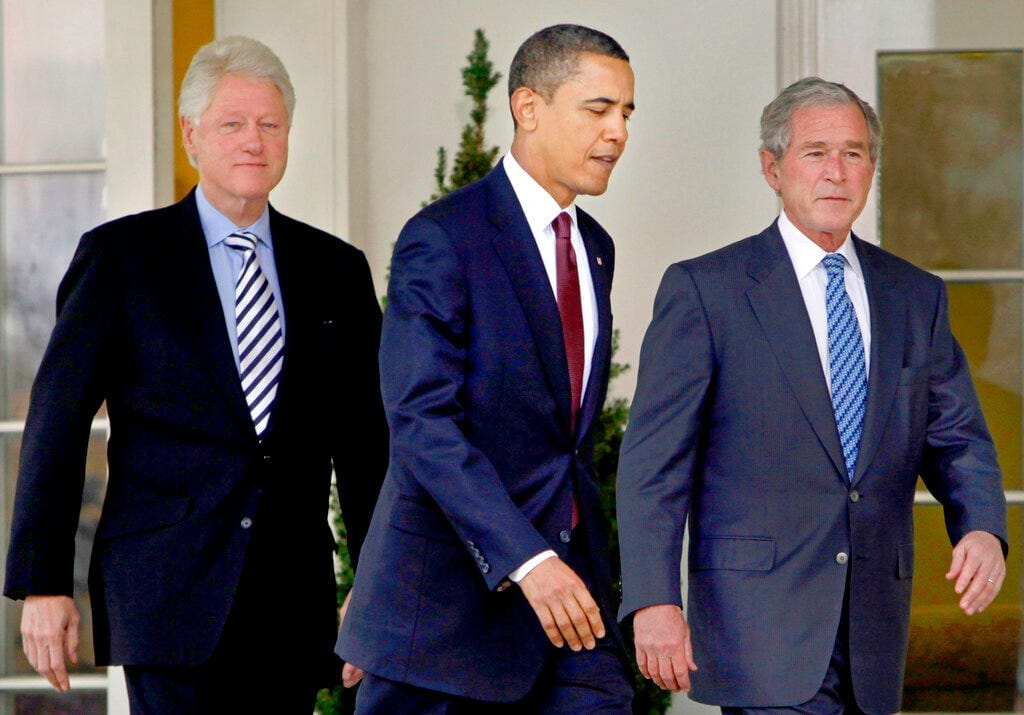
inquirer.com
Secret Service agents proficient in evasive driving techniques are used to transport previous presidents and vice presidents who have permanent Secret Service protection. It was reported in 2017 that George W. Bush has not driven on public roads in more than two decades.
5. Ex-Presidents Can Get Access to Security Briefings
When you are the leader of the United States, you gain access to the country’s intelligence services’ classified materials. As a courtesy, previous leaders are still granted access to daily security briefings after they leave office, provided that they meet one criterion first.

AP Photo/Pat Sullivan
It is entirely up to the current president whether or not a previous president will be permitted to join the briefings, which will contain sensitive information regarding internal and international circumstances. It is only fair that the sitting president has a say on this matter.
6. The Public Gets Access to Previous Communications
This rule is a provision of the 1978 Presidential Records Act, which was enacted in the aftermath of the Watergate scandal. During their tenure, all official communications sent by the president must be retained and archived. Though they aren’t immediately released, these archives must be shared with the public five years after their term concludes.
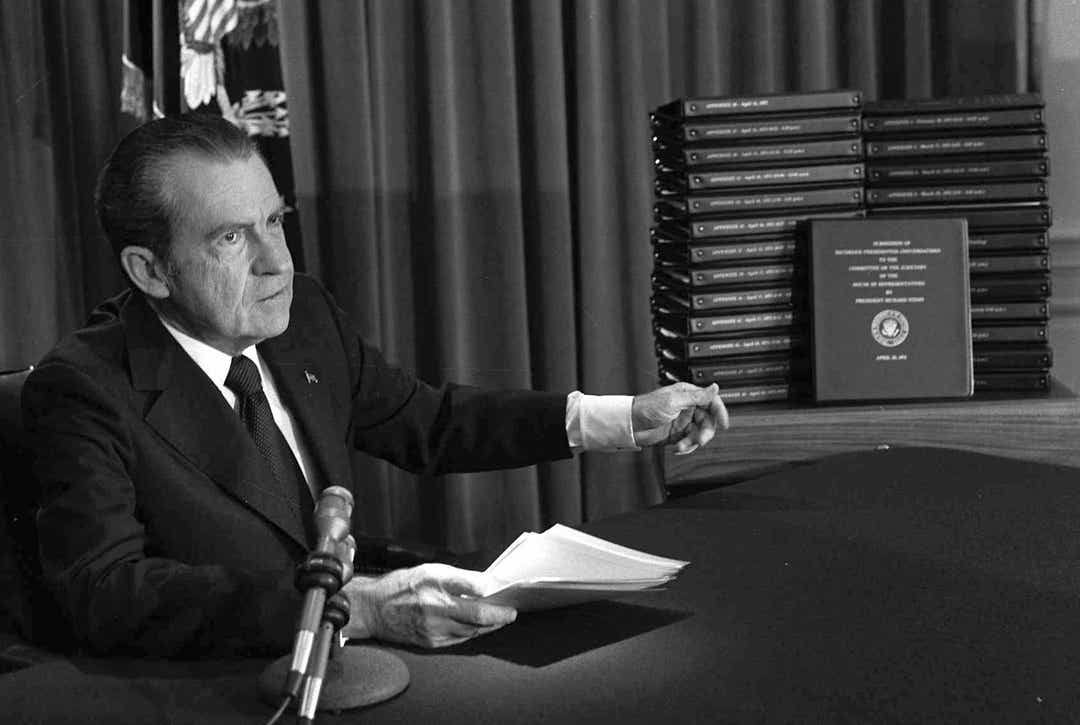
AP Photo
As of 2014, this regulation has been expanded to include any electronic communications relating to official business as well. This is why presidents are not allowed to use private email accounts when conducting official business. This may be distressing, as it may appear as though there is no longer any privacy. However, it is a safeguard for preventing corruption.
7. Government Health Insurance Doesn't Automatically Apply
Despite what you may have heard, previous presidents are not automatically entitled to lifetime government health insurance. Only those who have worked for the federal government for at least five years are eligible for this reward.

iefimerida.gr
This implies that presidents who only served one term and have never worked in the federal government before, such as Donald Trump, will be responsible for their own healthcare insurance after they leave the service. They won’t be guaranteed free health insurance. Instead, they will have to pay for it out of their own pocket.
8. Former Presidents Cannot Be Left Alone
There is no longer any privacy for the present and former presidents, as you might have observed. Secret Service detail is the most intrusive thing that someone could possibly endure, as retired agent Jonathan Wackrow revealed to NBC News.

AP Photo/Ron Edmonds
Imagine you’re at your home tonight and four strangers walk up and stand about in your kitchen – this is how Wackrow describes the Secret Service detail. As previously stated, an ex-president has the option of rejecting his permanent security detail and regaining some privacy. However, doing so would entail a significant amount of risk.
9. There Are Limits on Re-election
Considering how challenging the position is, most former presidents wouldn’t seek re-election for a third term. However, some people just don’t want to let go of power once they’ve gotten ahold of it. Thankfully, there’s a constitutional amendment preventing ex-presidents from getting too power-hungry. The 22nd Amendment was passed to ensure no president can serve more than two terms.
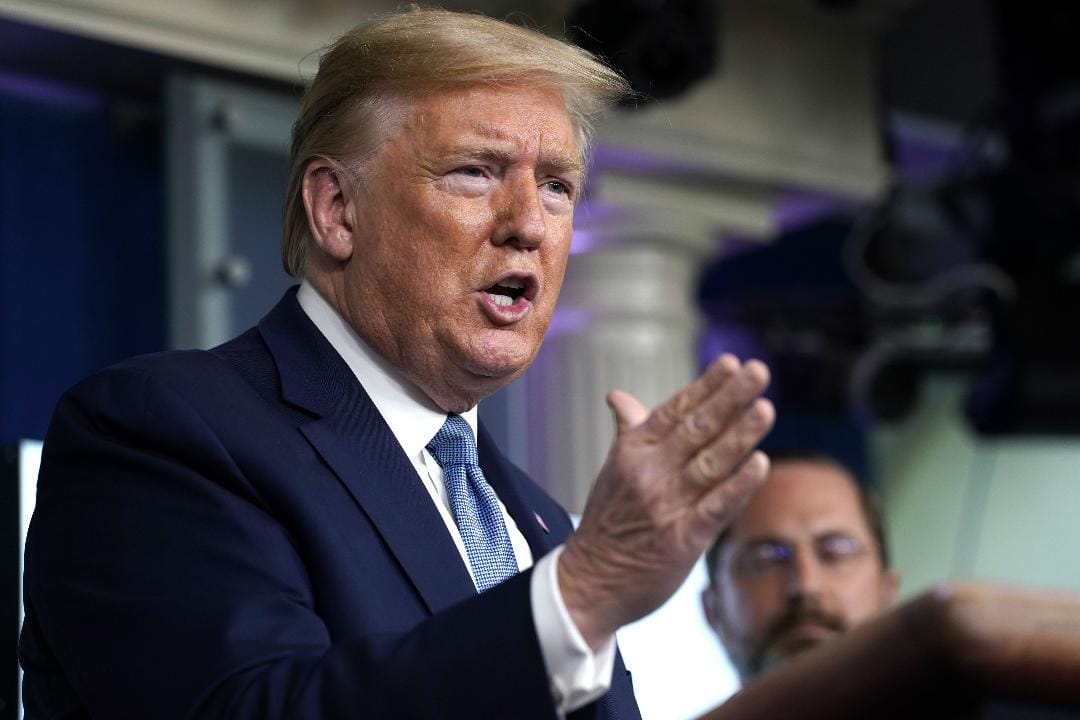
variety.com
As a result of Franklin Roosevelt’s unusual third and fourth terms in office (held in 1940 and 1944, respectively), this law was passed. It does not apply to presidents who only served one term, which means Donald Trump is free to seek re-election in 2024 if he desires.
10. Ex-Presidents Can’t Run for Vice Presidency
There were speculations that Joe Biden was planning to pick Barack Obama as his vice-presidential candidate for the 2020 Democratic party, but it would have violated the 22nd Amendment. This is because the vice president is first in line to take over the top role if the president is incapacitated.
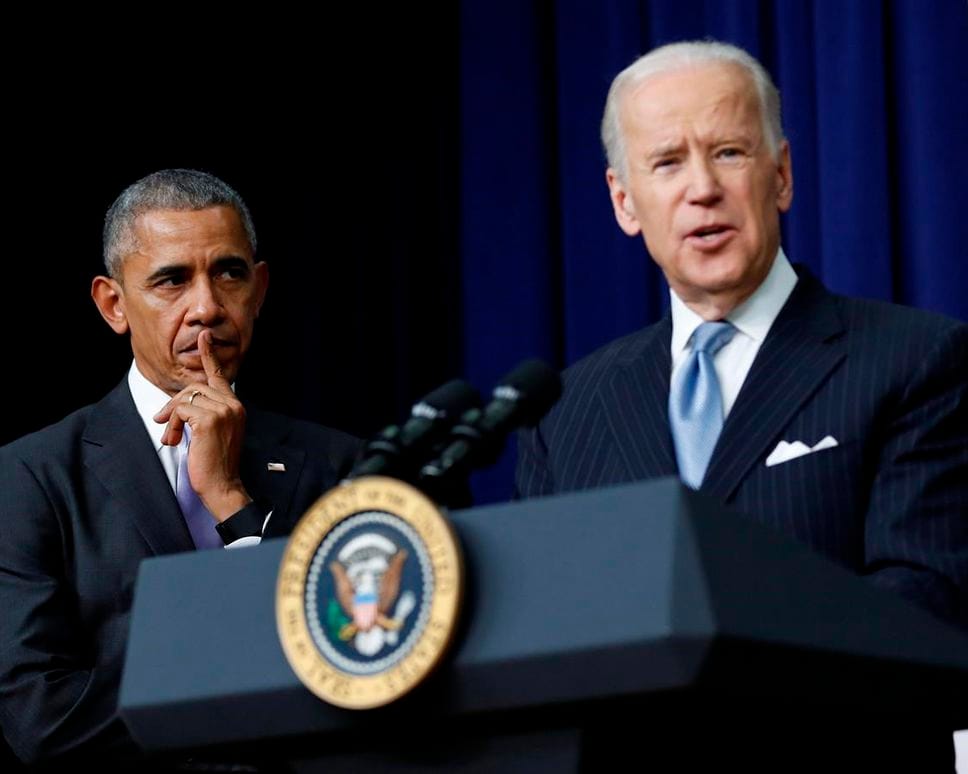
AP Photo/Carolyn Kaster
Thus, it only makes sense that former two-term presidents should be prohibited from taking that job. The closest someone can get to 16 years in the White House today is to serve as vice president for two terms before serving as president for two terms.
11. New Phones Must Be Checked By the Security Team
Former presidents, unlike current presidents, do not have to worry about every phone conversation they have being recorded for public consumption. However, they must still adhere to specific standards when it comes to their communications.

Presidents and previous presidents must have their electronic communications equipment, including mobile phones, approved by the Secret Service before using them. Therefore, if a former president wants to get a new model of mobile phone, they must first consult with their security team.
12. They Are Not Exempt From the Law
A president must be in the office to pardon someone currently serving time for a violation against the federal government. If a president were to be charged with a federal crime while being in office, this might mean that they could pardon themselves.
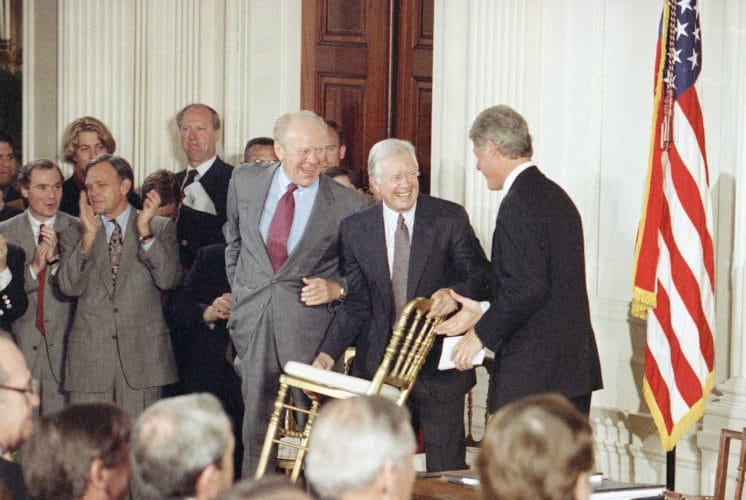
However, as soon as the presidency is over, they are subject to the same legal restrictions as any other citizen. People who have committed crimes are unlikely to be pardoned unless they have a big buddy in the White House, as Richard Nixon had during Gerald Ford’s administration.
13. Accommodation in the Presidential Townhouse
When they visit the nation’s capital, ex-presidents are strongly advised to remain at a particular property in Washington, DC. However, it is not a must. It only takes around two minutes to walk from the White House to the Presidential Townhouse, which is located at 716 Jackson Place.

aftonbladet.se
Under Richard Nixon’s leadership in 1969, the federal government purchased this four-story townhouse and turned it into a stately residence for former presidents. There are specially designated chambers in the basement for a Secret Service detail, which is one of the many reasons it is a good choice for previous presidents.
14. Longer Lifespan After Retirement
The average life expectancy of former presidents has increased significantly during the past several decades. Since Former President Nixon, the average retirement period for ex-presidents has climbed dramatically from 13 years to 22.5 years, a significant increase compared to the previous average of 13 years.

AP Photo/Reed Saxon
As a reference, the average term of retirement for other citizens is approximately 18 years. Jimmy Carter has the longest post-presidential life span to date, approaching 40 years in 2021, whereas James K. Polk has the smallest post-presidential life span, lasting only 103 days after his tenure ended in 1849.
15. They Must Have A Limited Number of Staff
Former presidents are given a budget for staff each year, but they should restrict it to a manageable size unless they are wealthy enough to pay some of the wages themselves. An average serving president’s staff is 400 individuals, and they have a $40 million salary fund to pay them all.
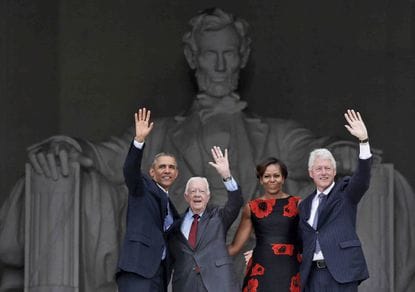
AP Photo/Charles Dharapak
Upon their exit from office, taxpayers only provide them with $96,000 a year to cover the costs of their employees. After leaving the White House, Barack Obama said he missed the “camaraderie” of his White House staff during an interview with Prince Harry on the BBC in 2018.
16. They Serve as Global Ambassadors
As far as the unwritten standards that former presidents are expected to observe, serving as a lifetime global ambassador is a solid one. In the United States, past presidents are expected to tour the world and promote the country in a favorable light overseas, and they are granted a substantial budget to do so.
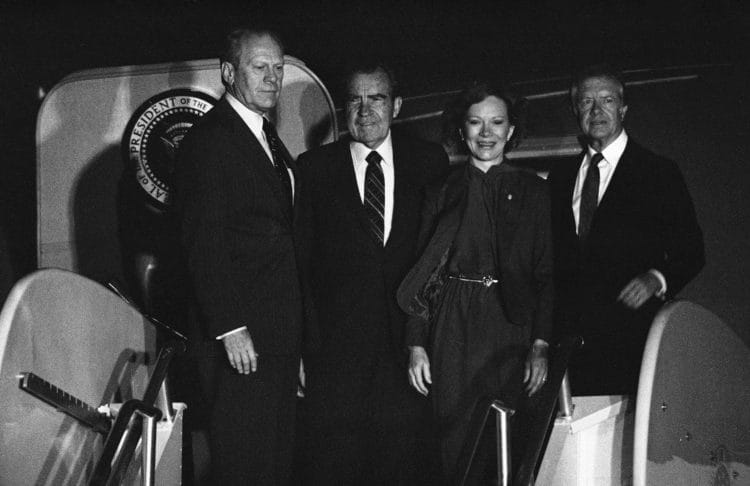
AP Photo/John Duricka
Former presidents and their spouses receive $1 million and $500,000 respectively in taxpayer-funded cash each year for travel. All previous presidents possess diplomatic passports, which allow them to travel internationally without paying fees or dealing with the frustrating bureaucracy that comes with a regular passport.
17. Their Mouths Should Be Kept Closed
In the eyes of American intelligence officials, former presidents pose a significant threat to national security. Their position necessitates an abundance of critical data, making them targets for other countries to exploit or bribe in exchange for information.
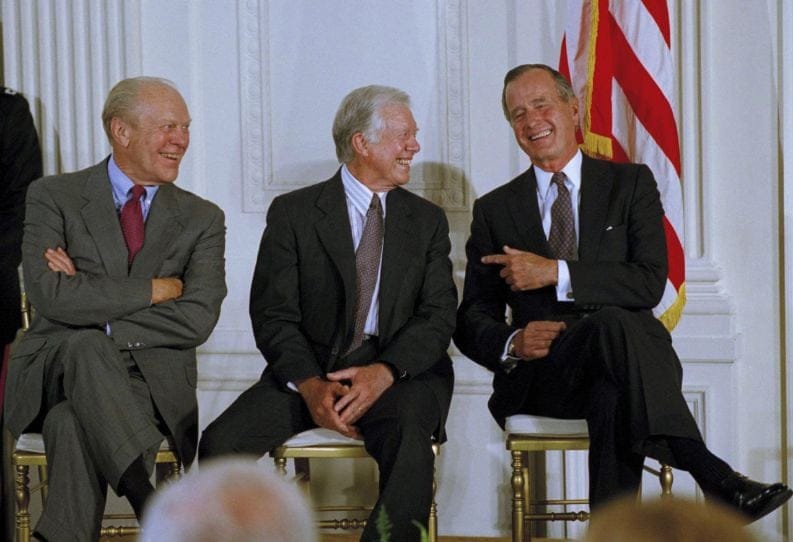
fdlreporter.com
A president has the authority to declassify and share whatever government material they like while in office without fear of being prosecuted or otherwise penalized. On the other hand, ex-presidents are prohibited from releasing any confidential info that they personally didn’t publicly disclose when they were in the White House.
18. A Good Source of Income
After leaving the White House, presidents can earn far more than the $400,000 salary they received while in the White House. As per CNN, George W. Bush collected an estimated $15 million from lectures alone in the first four years after he stepped down. He reportedly received at least $7 million from his memoir.

AP Photo/Tran Van Minh
From 2001 to 2012, Bill Clinton made more than $75 million in speeches and received a $15 million payment for his biography. Clinton declared in 2010 that he had never had money until elected to office. He also added that he had been doing really well since then.
19. They Should Refrain From Publicly Criticizing New Presidents
Though this isn’t an official rule, most previous presidents have followed this long-standing tradition. It has traditionally been considered good etiquette for previous heads of state to refrain from publicly criticizing their successors.

AP Photo/J. Scott Applewhite
Of course, not everyone abides by this unspoken rule. Several ex-presidents have publicly denounced the policies of the ruling administration. Presidents who have publicly taken a jab at their successors include Barack Obama, George W. Bush, Bill Clinton, Jimmy Carter, and Theodore Roosevelt.
20. Private Mail Is Monitored
The Secret Service is also entrusted with checking the mails of previous presidents, much like it approves their communications equipment. This is undoubtedly done for security concerns; however, it means that former presidents will never again be able to receive a letter that’s truly just for them.
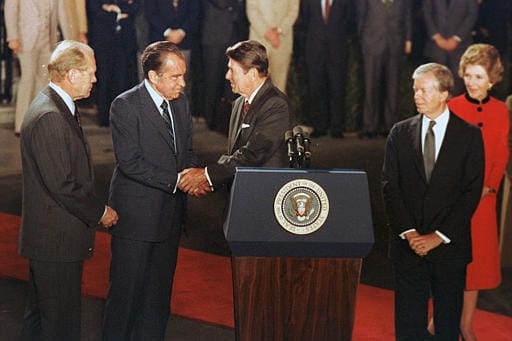
AP Photo
All mail of ex-presidents is screened at a secure location away from their house to ensure their privacy and security. This includes letters, notes, bills, and packages. Because of this, no former president will ever be able to surprise their favorite agent with a birthday gift purchased online.
21. Getting Used to Traffic Again
You don’t have to wait at a red light because of the presidential motorcade when you are the head of state. All of that comes to an end once you step out of the White House, which means you’ll have to get used to waiting in traffic once again.
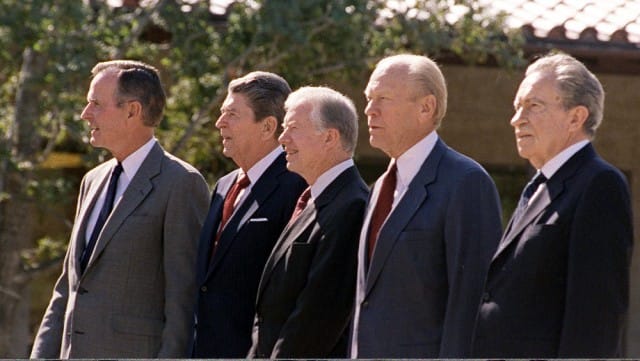
AP Photo/Marcy Nighswander
Obama claimed this was one of the most challenging transitions he had to deal with when he left office in 2017. The former president claimed that he was not used to encountering traffic. In fact, in the past, he was the one to cause traffic, much to the distress of those trying to get to work in the destinations he visited.
22. They Are Granted Resources for a New Office
The Former Presidents Act provides all previous presidents with the means to operate a new office. Each former president’s office can be situated anywhere in the United States, and the rent is covered by the legislation. Staffing and equipment are also covered by this law.
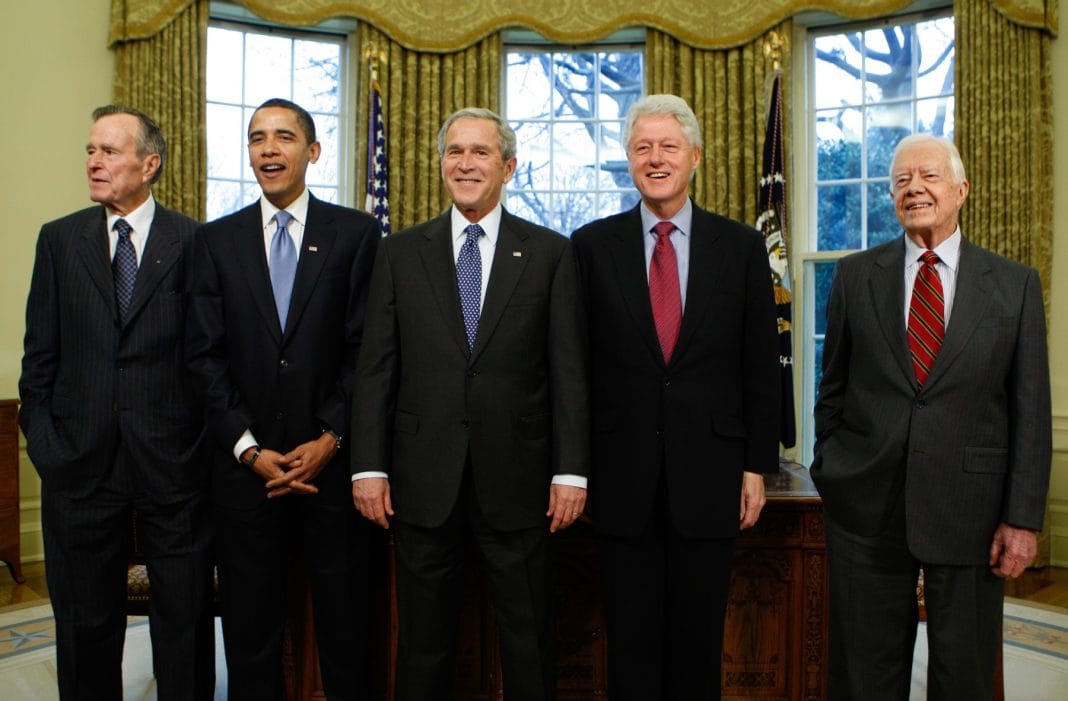
sdk.mk
Both Bill Clinton and George W. Bush billed more than $440,000 for their rentals in 2018 alone, which is more than any living ex-president. They make Jimmy Carter’s $112,000 yearly office rental seem economical by comparison.
23. They Must Assemble a Presidential Archive
The presidential library system is another method by which former presidents are responsible for preserving their official archives for the general public. Franklin Roosevelt devised this way of collecting communications linked to the nation’s most prominent position in 1941.

AP Photo/David J. Phillip
This was several years after he pushed to establish the National Archives Act in 1934. As a result, every previous president has developed their own presidential library. This is a formality that is as much about bookkeeping as it is about honoring their legacy.
24. An Annual Pension for Their Spouses
The spouses of past presidents are likewise covered by the Former Presidents Act. An annual pension of $20,000 is available to the ex-spouse of a president, and this is in place to cover them if the former president passes before they do. This pension fund is also financed by taxpayers.

lenta.ru
In order to get this small and very reasonable income, the spouse must give up any other pensions or annuities they may have. As a result of this restriction, once their spouses died, neither Nancy Reagan nor Betty Ford took their annual payouts. The $20,000 figure is just too small.
25. They Enjoy More Freedom Than Before
Previous presidents have a great deal of personal freedom once they retire from office, despite the fact that there are still a number of things they can’t do. They can now, for example, see movies at a mall, dine at any restaurants they wish to (including fast-food restaurants), and fly commercially again.

chron.com
Former President Barack Obama stated that he appreciated the freedom to decide how he wanted to spend each day once he stepped down from office. In 2018, he said that it’s nice to be able to control your day in a way that you just can’t do as president. He certainly does seem a lot more relaxed nowadays.
26. They Will Be Given A State Funeral
Though it’s not something they’ll be able to enjoy the advantages of, both former presidents and the president-elect have the right to a state funeral. This was what was done for former President George H.W. Bush (George W. Bush’s father).
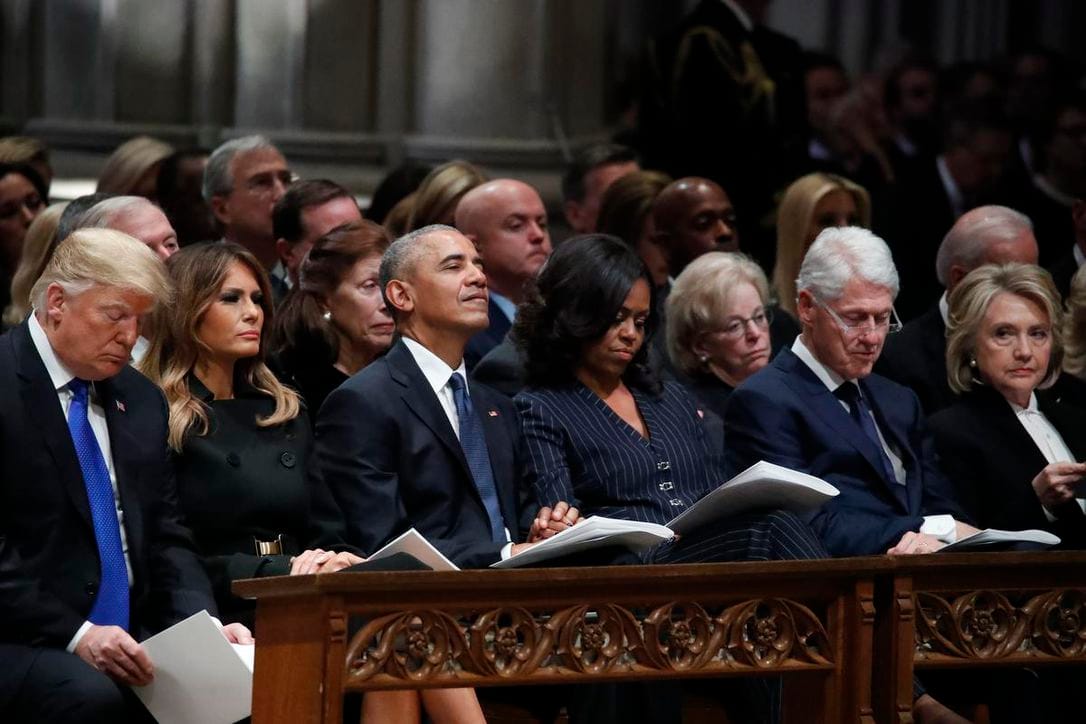
AP Photo/Alex Brandon
Frequently, these funeral ceremonies are global gatherings of sorrow that are packed with lavish ceremonies and displays of veneration. The US military has a 138-page document that outlines the required processes for presidential funerals. It includes details such as the procession’s maximum pace, the guards’ footsteps, and flower arrangements, to mention just a few of the many elements that are covered.
27. They Have to Help Organize Their Own Funeral
As part of the funeral planning process, presidents have the opportunity to include personal touches that will allow them to express their identity and legacy on a national scale during their last moments.

Source: Wikimedia Commons
In many respects, funerals serve as a final opportunity for the deceased to communicate to the country and express their ultimate desires. A person who writes their will early is typical, but arranging your own funeral when you first enter the Oval Office must be an odd feeling.
28. Technology Usage Is Monitored
Nowadays, big tech is literally monitoring everyone’s every move through their cell phones, but the situation is a little different when it comes to previous presidents and their activities. From former presidents’ new phones to new emails, everything is monitored to ensure their safety.

Source: sigmalive.com
While the government is compelled to get a warrant before conducting any kind of surveillance on its own people, it is not needed to do so for past presidents on the grounds that they must be protected from external dangers.
29. They Can't Be Spontaneous
As a result of not being permitted to go anywhere alone, former presidents are also restricted in their activities. The reason for this is that the Secret Service has to know where they’re going and what their plans are ahead of time.

Source: Wikimedia Commons
Secret Service officers have to survey the area, and this may take days or even months. Also, keep in mind that this will be the case throughout their lives as former presidents. So, when it comes to being president, there’s no room for spontaneity.
30. A Transitional Stipend Is Given to Them
Every president, including those who resign, receives a stipend for the first six months following their departure from office to assist them in their transition back to non-political life. This greatly benefits the departing presidents, allowing them to adjust to the change.
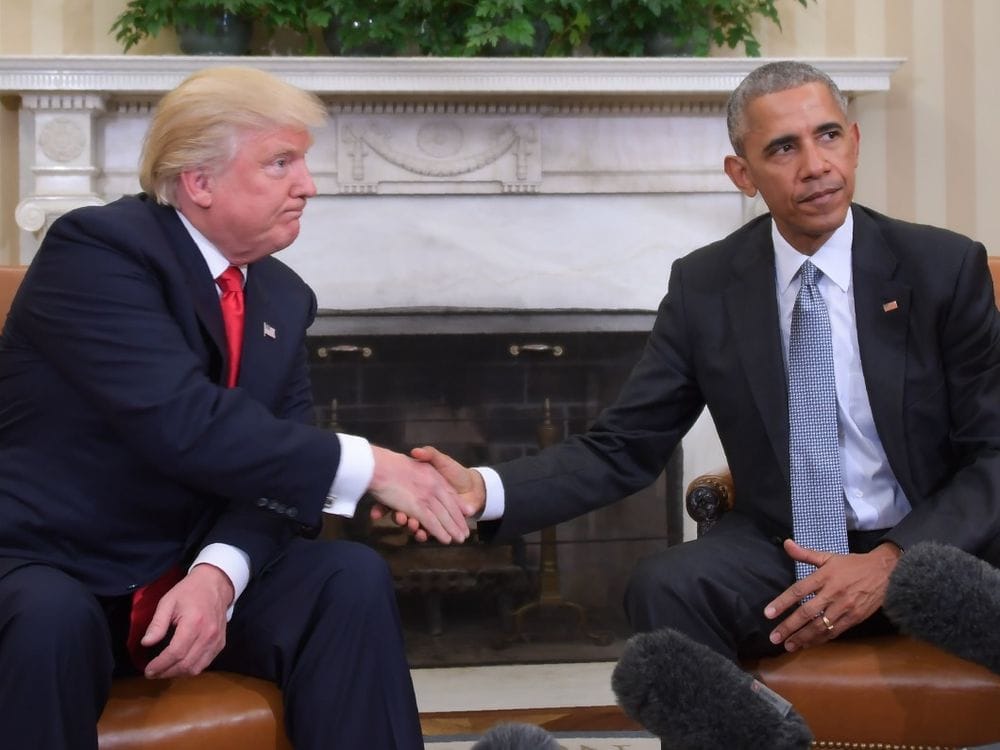
Source: lexpress.mu
This transitional payment is funded by the federal government up to a maximum of $900,000. It helps former presidents find new office space, pay their staff, and arrange other services related to the presidential transition.
31. Rules Acting Presidents Have to Follow
No matter how long they’ve been out of office, former presidents are nonetheless subject to an array of obligations. These are in place to protect their safety and the national secrets they hold. What about the acting presidents, though?
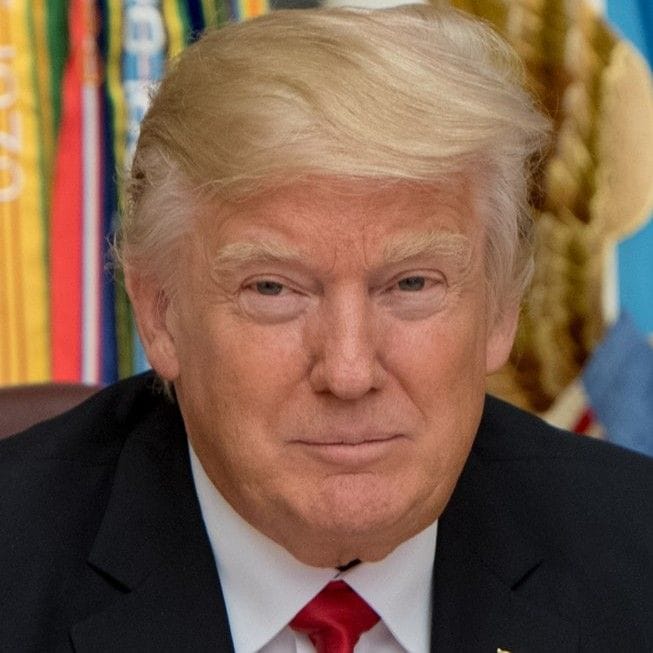
Source: Wikimedia Commons
As you might expect, the acting president also needs to live by a slew of peculiar regulations, some of which are stranger than those applied to former presidents. Being the head of the United States is not your average job.
32. They Miss Family Events
Many schools implement activities that parents are invited to attend, such as open house, family days, and sports days. Unfortunately, and as one might imagine, serving as President of the United States can negatively impact one’s family and relationships.

Source: Instagram
The incumbent president cannot attend any school athletic activities or concerts since it would involve too much planning and be disruptive for the other guests. It might even put presidents and their families at risk.
33. Everything Must Be Planned Out Ahead of Time
As previously stated, past presidents must notify the Secret Service of any places they wish to visit. This is also the case for the sitting president. The Secret Service detail has to monitor the area and ensure it is safe before letting the president enter.

Source: YouTube
During his time in office, former President Obama made a dash to Starbucks, which led to the Secret Service shutting off a portion of the street and directing pedestrians away. This also happens whenever the incumbent president wishes to dine at a restaurant.
34. They Must Still Pay for Their Own Homes
Whenever a president relocates to the White House, they must leave their previous residence behind for a period of at least four years. During this time, they must pay the mortgage on their former property, as well as any necessary maintenance costs.

Source: Frank Winkler
Of course, this is also the case when the president’s term has come to an end. They are more than obliged to pay for their home’s mortgage and other obligations, such as energy, water, and internet expenses.
35. Ex-Presidents Can Deny Secret Service Recommendations
These rules are something all presidents and former presidents must follow. These guidelines were established to ensure their safety and to avoid any unnecessary risks or danger.

Source: Reddit
Secret Service agents’ recommendations are expected to be followed by the president, although they are only recommendations. In the end, the president has an ultimate say in everything, and the Secret Service has to adhere to that, no matter how risky or foolish it may be.
